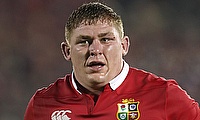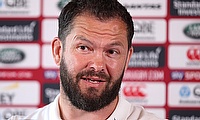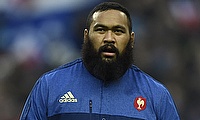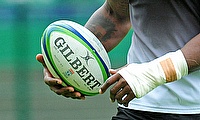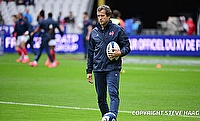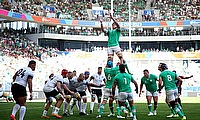‘Dartboard’ format for future World Cup draws could be solution to avoiding lopsidedness of quarter-finals
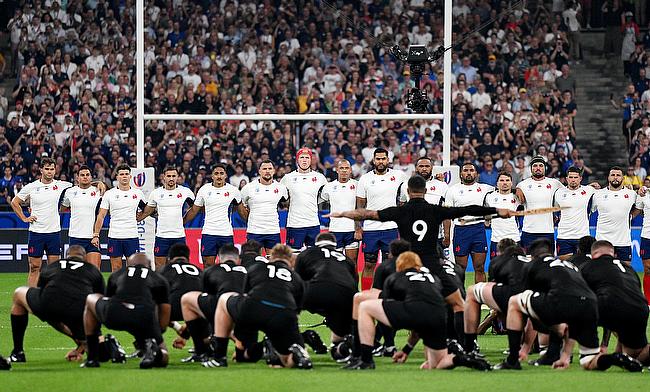
France and New Zealand face South Africa and Ireland in the World Cup quarter-finals
©hoto by David Ramos - World Rugby/World Rugby via Getty Images
World Rugby’s decision to hold the 2023 World Cup draw three years ago has come under severe scrutiny after producing what many critics believe is a lopsided and unfair tournament with one half of the quarter-finals containing the top four teams on the planet.
As a result, this weekend’s last eight ties see the four teams who made it through Pool C and Pool D gifted, on paper, a much easier path to the semi-finals.
Pool C and D toppers, Wales and England, face Argentina and Fiji ranked eighth and 10th in the world respectively. The Pacific Islanders were beaten by Portugal in their final pool game but under the current system, they scraped through as they only needed a losing bonus point to send Australia home.
In total contrast, on the other side of the draw, No.1 ranked Ireland take on three times World Cup winners New Zealand while hosts France face a mammoth task against defending world champions South Africa. It means two of the tournament favourites will be knocked out in the quarter-finals. That is why there is a pressing need for an updated World Cup format.
There are already some positive signs for the organisation of the 2027 World Cup in Australia, with World Rugby Chairman Sir Bill Beaumont insisting they will delay the 2027 draw to ensure balance and consistency.
Beaumont told The Breakdown: "We will be looking at having the pool draw as late as possible so that you can get more consistency around the balance in a pool."
However, getting the mathematical equations correct to deliver a much “fairer” draw is imperative and that is exactly what Dr Anthony England, a British PhD scientist based in Utrecht in the Netherlands, believes he can help achieve.
Dr England has developed his own original World Cup ‘dartboard’ format, catching the attention of football World Cup organisers FIFA. He recently held talks with football’s world governing body over a potential World Cup shake-up. Significantly, Dr England has adapted his FIFA proposal to provide a solution to the heavily criticised current Rugby World Cup format.
LINK TO DR ENGLAND'S CONCEPT
The academic told TRU: "The tournament just doesn't build early momentum as it could. There's not much positive about five-team groups, except for people who want the longest possible tournament. It's currently a season, not a tournament.
"I did my PhD in chemistry. I'm an analytical thinker. I like problem-solving, puzzle solving and I guess I look at sports tournament formats as puzzles when I see problems to be resolved. I just want to see fairness, and a great, well-designed tournament, optimised for the players & fans. I was so close to affecting the next football World Cup. It was exciting for a brief moment!
"Before even contemplating the fact that the groups for this particular tournament [Rugby World Cup] were organised three years ago - that's just bonkers, and we all know it - this current tournament is incredibly imbalanced and although some people might consider my concept a little weird or unbalanced, it really isn’t. There's an intrinsic balance in my proposal and I've done everything possible to make sure each team has equivalent strength match-ups for all four games."
So if the dartboard format was applied to the 2023 World Cup, England's fixtures could have looked like this (based on current world rankings)
England = B2 so would've played France (A2), Fiji (C2), Georgia (D2) and Uruguay (E1)
OR
Applying it to France (A2) = England (B2), Fiji (C2), Portgual (D1) and Uruguay (E1)
But in the current format, Fiji lost twice and still went through because their fixtures were 'easier' than Scotland's, for example. Having 'pools' which are more balanced would place even more importance on gaining try and losing bonus points, which is what the dartboard format aims to achieve.
Dr England’s dartboard format is designed to work for 20 teams and it could also work for 24 which is an increase being touted for future World Cups.
He explained: "It would be a novel way to do a 24-team tournament in the future if the rugby authorities decide to expand in that way. A pool/group stage need not be little groups, it could indeed be one big group of all teams, with all results being tabulated with the top eight teams qualifying for the quarter-finals. [Similar to the Champions Cup over the last couple of seasons].
"It's much like at the end of the football season where there is one big table, and several teams are fighting to get into the top four for the Champions League. There would be a lot of drama around sixth to 10th in the final round of games of the Rugby World Cup pool stage.
"One thing that the single table of 20 or 24 teams does is keep everyone on their toes because it's not only important for the teams to qualify but they also want to qualify in the best possible position so it should put more emphasis on winning well in every game because you're not just playing to come in the top two out of five. Each team is trying to make sure they are well positioned in the top eight to get the best possible quarter-final pairing - 1st play 8th, 2nd play 7th etc.
"That should all mean that games are more competitive later on. I really hate 'dead rubbers' of any kind in any tournament. I think they're awful for fans.
"In Pool B of this World Cup, Scotland got knocked out, but in my concept, they could still be in the top eight teams because they could have ended with a better overall points total than the worst 12 teams. That's the beauty of the natural asymmetry in this circular match-up format.
"I'm all for good mathematics, that's the way to build a fair points system, and I'm pretty sure I'm better at maths than FIFA and World Rugby."


